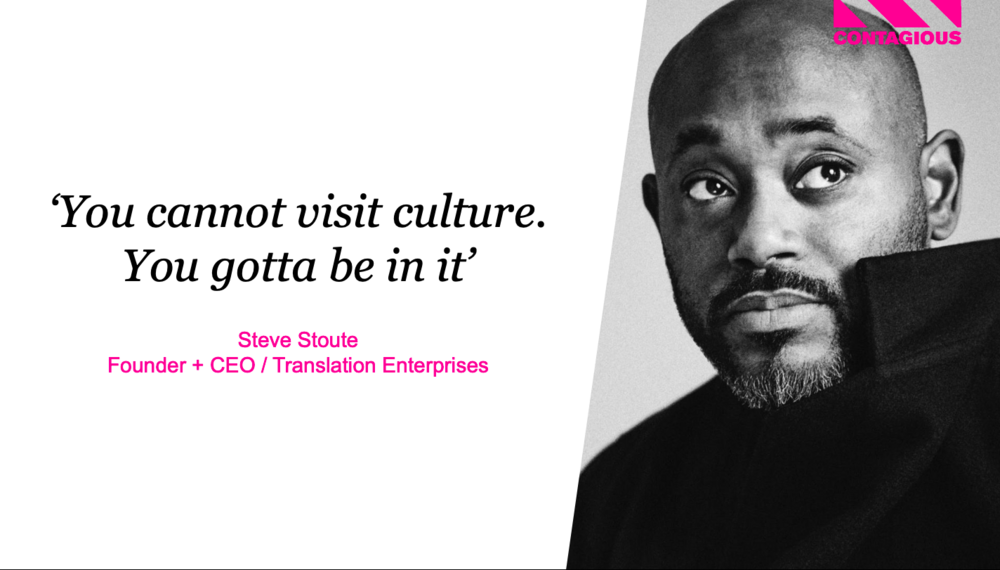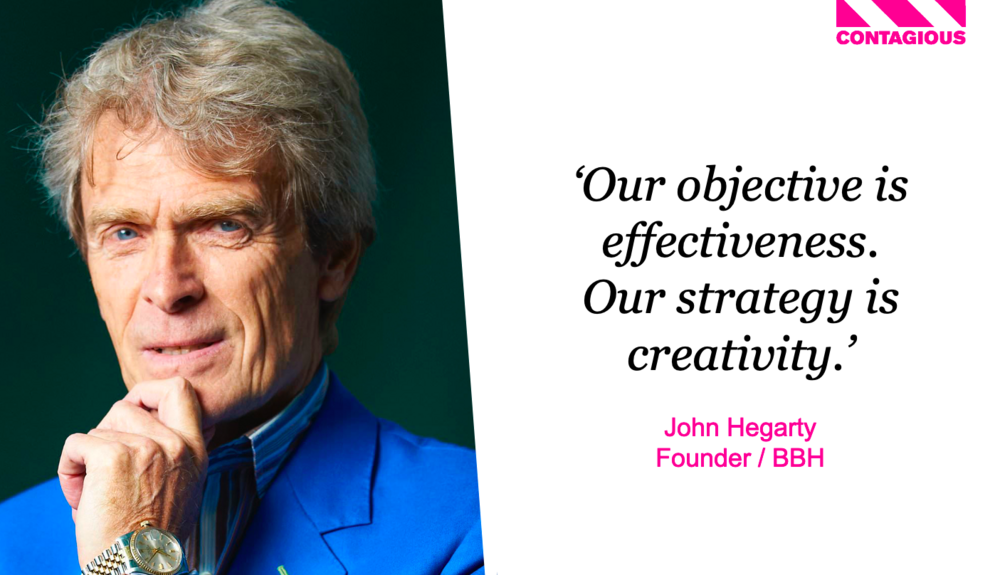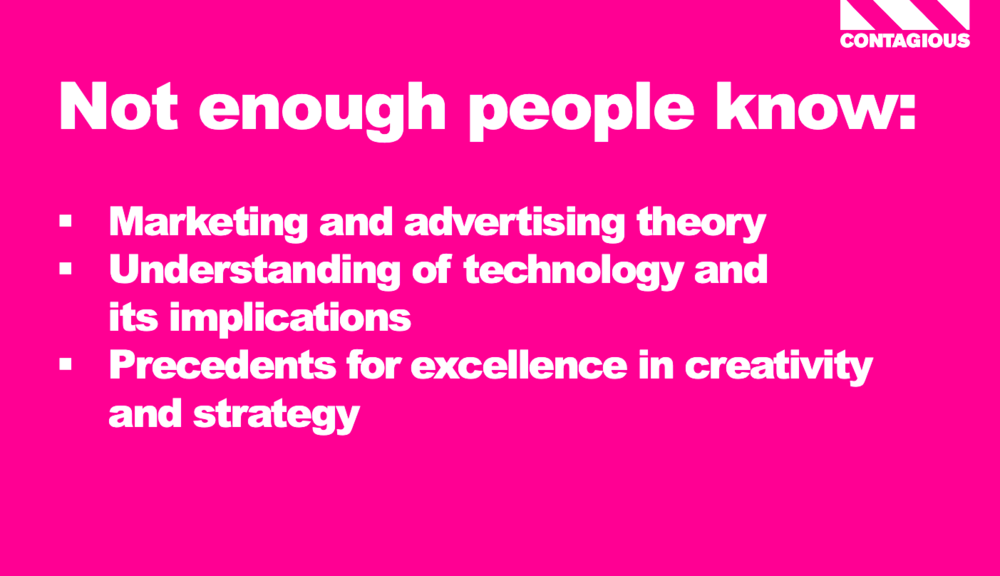6 bits of advice for the next decade from Contagious /
We’re four-and-a-half months into the 2020s and there’s everything to play for
Katrina Stirton Dodd
/
You should have been there. Last Wednesday, Contagious kicked off its Lockdown Learning livestream series – in partnership with Clear Channel and Audiense – with Advice for the Next Decade, a 45-minute scene-setter for the 2020s. With the Covid-19 pandemic dominating the here and now, the session was an opportunity to engage with the bigger picture and think about some of the factors we can depend on – as well as those we cannot.
Here’s five key takeaways from the session.
1/ Beware of anyone who claims to predict the future
Like the rest of the world, Contagious did not see the coronavirus coming. We did not expect to see companies from LVMH to Brewdog repurposing their production facilities to churn out hand sanitiser for hospitals.
The future, by definition, is uncertain and people hate uncertainty. So when someone comes along and claims to give you certainty by predicting what’s around the corner, it’s something we instinctively tend to reach for. But the future is fundamentally unknowable, and even if you guess correctly what will happen, there’s endless scope to be wrong about why. Even Philip Tetlock, one of the world’s leading forecasting experts concludes that, having studied the field for decades, ‘the accuracy of expert predictions declined towards chance five years out’.

Image by Santeri Viinamäki
2/ Skate to where the puck is heading
So where can we turn when seeking an edge that will set us up for success in years to come? Technology or, specifically, the exponential forces driving the sector. Ray Kurzweils’s thinking on the Law of Accelerating returns applies not only to improvements in hardware, but also in software and beyond. The exponential forces we need to consider include cost: as the capacity of our technology has burgeoned, the price of processing power has fallen to virtually nothing. In an uncertain world technological progress is one of the most dependable factors: invest in understanding the trajectory of the tech most pertinent to your category and use that to guide your strategy.

3/ Learn to spot the difference between what’s old and what’s new
Sounds simple, but it’s easy to be complacent. Amazon and Tesla were underestimated by legacy competitors who failed to grasp how different and disruptive these businesses were. Now, whole categories are on the back foot as they race to redefine themselves according to rules being rewritten by (Amazon founder) Jeff Bezos and (Tesla founder) Elon Musk.
Adland, on the other hand, often leans too far the other way, chasing after the shiny new whatever-it-is and failing to see the value in what’s gone before. There are opportunities in the old because most people don’t know the precedents. You can save yourselves a huge amount of time and energy by not reinventing the wheel and learning from the pioneers. And there’s opportunities in the genuinely new because there is no precedent for it. You can write your own rules and wrong-foot your competitors.

4/ Become culturally fluent
This is for anyone still talking about ‘inserting their brand into culture’, which sounds like a procedure that requires rubber gloves and a studious lack of eye-contact. We’re supposed to be an industry of communications specialists. Vocabulary matters and what this phrase suggests is an unwelcome, invasive and slightly desperate way of trying to find relevance with your target audience – think Ivanka Trump at the G20 summit.
The cure lies in something Translation Enterprises founder Steve Stoute said in Cannes last year: ‘You cannot visit culture, you gotta be in it’. You can’t be a tourist, dropping in for a quick Culture mini-break: you have to commit. You need a process to triage new platforms and tech, and people with the time and enthusiasm to become fluent in those most relevant to your brand. Get that right and the rest will follow.

5/ Fight the forces of anti-creativity
Sir John Hegarty (who co-founded BBH) described the goal of agencies like this: ‘Our objective is effectiveness, our strategy is creativity’. But it’s something clients and the wider business community needs to embrace more wholeheartedly, too. Research from Dr Kyung Hee Kim found that over the last 25 years, creativity has been in ‘steady and persistent decline’ in the USA – but it’s likely to be an issue elsewhere too.
Professor Teresa Amabile has spent over 40 years studying creativity and motivation. Writing in Harvard Business Review, she lays a lot of the blame on management, saying that while they may not do it on purpose, ‘in the pursuit of productivity, efficiency, and control, they undermine creativity.’
There are a whole range of anti-creative forces. Some of them are easy to spot, like the stuff that Amabile mentions, but some are totally invisible. Cornell University’s famous research paper The Bias Against Creativity found that most people have a totally innate bias against creativity, a bias most are unaware of.
And here we all are in 2020 with the global economy on an indefinite pause. To survive this, businesses will need to be more agile than ever. They’ll need to be able to evolve. And that’s where things get interesting. Because according to the neuroscientist Beau Lotto: "The importance of agility is that it underpins creativity.” In other words, agility itself is not the key to survival. It is a method for achieving creativity, and it’s the creativity which will help you to evolve. That’s why fighting anti-creative forces – seen and unseen – must be a priority.

6/ Know more than the next person
At Contagious we spend a lot of time working with agencies and brands, and the people who run them. And the thing we’re most consistently struck by is the widespread lack of knowledge in areas critical to the future success of those enterprises: basic stuff, like the history and theory of marketing and advertising, and the precedents for excellence in creativity and strategy. That’s not OK.
This is an industry of knowledge workers in a knowledge economy. The more you know, the more valuable you are. That is going to become increasingly true in the next decade.
Check out our full list of Lockdown Learning livestreams, investigating some of the most pressing issues facing brands and marketers, here.
Want more of the same? /
We don’t just write about best-in-class campaigns, interviews and trends. Our Members also receive access to briefings, online training, webinars, live events and much more.







